Women Igniting Change®
In a post pandemic world, employees are demanding that their leaders do more than just lead the business. They are looking for their companies to provide a culture of purpose and possibility, navigate changing societal expectations and build a sense of community and belonging. Leaders need to elevate and engage their people by connecting personal values with those of the entire organization, and at the same time inspire collaboration, innovation and results. Robbin Jorgensen, Founder and CEO of Women Igniting Change®, is your host. A former corporate executive who has worked with women leaders in 31 countries on 6 continents, she believes that unleashing the contribution of women is one of the key drivers to moving business and humanity forward. Join Robbin every Monday as she dives into the intersection of business results, women’s leadership and social responsibility. She’ll share interviews with decision makers, provide tangible strategies, highlight women change makers and more as she inspires you to take action…for yourself, your organization and our world.
Episodes
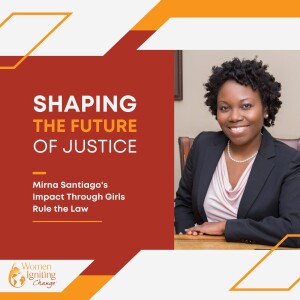
Monday May 13, 2024
Monday May 13, 2024
“There should be something I can do to make it easier for the girls who had my own experiences so they’re not bumping around in the dark like I was,” says today’s guest Mirna Santiago, lawyer lecturer and “bias-buster” who founded Girls Rule the Law, which provides underprivileged and underrepresented middle and high school girls the opportunity to learn about the law, the legislature and the judiciary. An Afro-Latina immigrant to the South Bronx, Mirna grew up feeling underrepresented and alone in her lived experiences. Only after returning to the Bronx years later, and seeing how little had changed, did she realize it was up to her to show young women what the world holds for them if they’re willing to roll up their sleeves. On today’s episode, Mirna talks to host Robbin Jorgensen about the programs that Girls Rule the Law offers, including the mock trial series that both ignite students’ passion and provide them with the frameworks that will allow them to make their voices heard.
Following the dictum that “your network determines your net worth,” Girls Rule events put students in touch with professional women from across the legal profession. They learn etiquette, interviewing skills, resume building and are granted access to the kind of professional attire that will allow them to move fluidly in a variety of situations.
How is Girls Rule shaping the future of justice? Find out on today’s episode.
Quotes
“There should be something I can do to make it easier for the girls who had my own experiences so they’re not bumping around in the dark like I was.” (2:39 | Mirna Santiago)
“So, we’re trying to create a network of women that are going to help these young ladies, give them internships and jobs and that sort of thing. And that was really the impetus. It was just like, ‘Oh, my God, I ran away from this place all these years ago and it’s still exactly the same.’ And it’s not fair to the kids that are still here that people like me do run away.” (7:09 | Mirna Santiago)
“I don’t feel that the impetus is going to be there when I retire. It’s not going to be there 13,15 years from now because things are happening now. There are rollbacks of our reproductive rights right now, there are rollbacks of other people’s freedoms now, with the LGBTQ. So, for me, I feel like I need to empower women to speak out now, to be in the places that matter now, and not 15 years from now or 13 years from now when it would be easiest for me to do. It’s not always easy to do what’s right.” (9:01 | Mirna Santiago)
“If you can see it, you can be it. Initially when I went to the schools, I would try to dress down because I just wanted them to see me as one of the people they see every day. And they started asking me, ‘Well, is that what you’d wear to court?’ and I thought, ‘Oh, wow.’ So, I started going in suits and they were far more impressed with that.” (15:46 | Mirna Santiago)
“The kids want to feel like they’re having fun even as they’re learning, and I think everybody really wants that.” (22:56 | Mirna Santiago)
Links
Connect with Mirna Santiago:
Website: https://girlsrulethelaw.org/
LinkedIn: https://www.linkedin.com/in/mirna-s-95193a10/
Implicit Bias Assessment: https://implicit.harvard.edu/implicit/takeatest.html
Connect with Robbin Jorgensen (She/Her):
Website: https://womenignitingchange.com
LinkedIn: https://www.linkedin.com/company/women-igniting-change/
LinkedIn: https://www.linkedin.com/in/robbinjorgensen/
Facebook: https://www.facebook.com/robbin.jorgensen/
Podcast production and show notes provided by HiveCast.fm
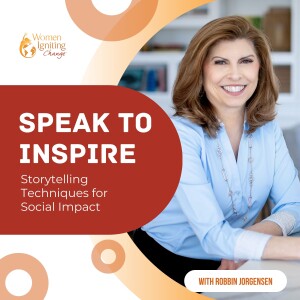
Monday May 06, 2024
Monday May 06, 2024
“It’s more than just telling of events; it’s really about making connections,” says host Robbin Jorgensen about the importance of effective storytelling to the impact of your message. Today she’ll share three key steps to take to ensure your audience, whether at a large event or in a small meeting room, hears your message, connects to it, and forms a long-lasting relationship with you as a result. She’ll share the three types of audience members that you’ll want to engage and how to ensure your message captivates them all.
She’ll also share tips for an engaging presentation style that will help you carry your story confidently from the beginning to end. Learn how to determine the best platform and mode of delivery to meet your target audience where they are.
Your message matters and only you can deliver it in your own unique way. Join today’s episode of Women Igniting Change to learn how to make the world sit up and listen.
Quotes
“It’s more than just telling of events; it’s really about making connections. And it’s how we turn abstract ideas and emotions into action. Great stories foster that human connection, while making sometimes really complex ideas understandable and relatable at the same time.” (1:02 | Robbin Jorgensen)
“Before you can even begin to craft your story, you need to be really clear about what you want to achieve.” (1:51 | Robbin Jorgensen)
“Just be you. The most impactful stories are those that are told with passion and sincerity—and trust me, your audience can absolutely feel the difference, so be authentic.” (4:55 | Robbin Jorgensen)
“There are so many different ways to get your message and your storytelling out there. So, be really creative in how that happens, and then choose your medium—to the degree that you can—that best suits your message and your audience.” (7:55 | Robbin Jorgensen)
“Command that space and know that you belong in front of whatever room you’re in, and that what you have to say matters.” (10:41 | Robbin Jorgensen)
Links
Connect with Robbin Jorgensen (She/Her):
Website: https://womenignitingchange.com
LinkedIn: https://www.linkedin.com/company/women-igniting-change/
LinkedIn: https://www.linkedin.com/in/robbinjorgensen/
Facebook: https://www.facebook.com/robbin.jorgensen/
Podcast production and show notes provided by HiveCast.fm
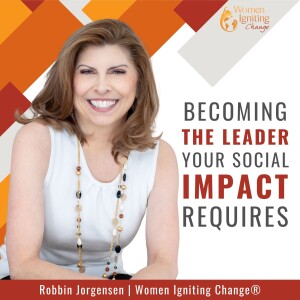
Monday Apr 29, 2024
Monday Apr 29, 2024
“If you’re going to be the face of whatever this social impact is, how do you need to show up differently than you do now?,” asks host Robbin Jorgensen. On this episode of Women Igniting Change, she asks you to think ahead five years about the level of social impact you want to be making, and then tells you what you need to begin doing now to be the kind of leader who will rise to that occasion. You’ll have to dig deep, and even become a little obsessed but with Robbin’s advice, you’ll soon be setting your future goals in motion.
Start with these questions: Who are the key figures in your space and who would you like to emulate? What beliefs do you need to adopt and which do you need to leave behind to become who you want to become? Learn the affirmation statement she recommends writing down to bolster your conviction and sense of self, as well as which question is so crucial she asks it twice.
Quotes
“As you step out and put your talents and your expertise and your guidance and your passion out there, it is going to require more and it’s going to require that you step into the leader that you need to be in order to make that happen.” (0:43 | Robbin Jorgensen)
“Begin to think through the skills that you’re going to need five years from now based on where you would like your social impact to be and who you need to be to run it at that time.” (3:18 | Robbin Jorgensen)
“If you’re going to be the face of whatever this social impact is, how do you need to show up differently than you do now?” (4:34 | Robbin Jorgensen)
“What do you expect of yourself to make your social impact happen? This is a really big question. And I will tell you, for us, when we started working in Rwanda seven years ago, I really had to step back and ask myself that question. What was I going to expect of me, what was I going to expect of my team that was greater than where we were at the time? Really embody that and put yourself in the spirit of that.” (6:48 | Robbin Jorgensen)
“Who are some of the leaders that you deeply admire in the world? These can be part of your family, your community, or famous people you know who are leaders in your mind? Why do you admire and respect them as a leader?” (9:25 | Robbin Jorgensen)
Links
Connect with Robbin Jorgensen (She/Her):
Website: https://womenignitingchange.com
LinkedIn: https://www.linkedin.com/company/women-igniting-change/
LinkedIn: https://www.linkedin.com/in/robbinjorgensen/
Facebook: https://www.facebook.com/robbin.jorgensen/
Podcast production and show notes provided by HiveCast.fm
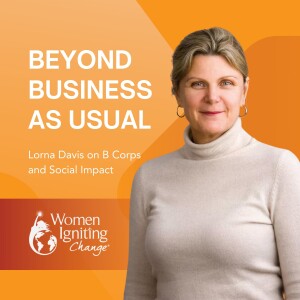
Monday Apr 22, 2024
Monday Apr 22, 2024
“Businesses should have a social conscience,” says Lorna Davis, former CEO of Danone North America and a fervent advocate for using business as a force for good. “They need to be held to account for their impact on the people and the planet whose resources they use.” On this episode of Women Igniting Change, Lorna recounts her eye-opening experience in China, which pivoted her career towards sustainability and social responsibility. This shift led her to champion the B Corp movement, where businesses commit to high standards of social and environmental performance, accountability, and transparency.
Lorna shares the challenges she faced while integrating Danone with WhiteWave, steering the newly formed conglomerate toward B Corp certification, and establishing a mission that encourages employees to pursue a purpose larger than their daily tasks. She shares insights from her TED Talk on collaborative and purpose-driven leadership, emphasizing the role of impactful work that leaves a legacy to be proud of.
By discussing practical steps that businesses can take—such as starting with a single unit and employing tools like the B Corp impact assessment to gauge their societal impact—this highlights the importance of local action and legislative influence in the regions where businesses operate. It also foresees the varied evolution of the B Corp movement across different geographies.
Lorna urges listeners to let their heartbreak fuel their actions towards meaningful change. Join today’s discussion to learn how you can contribute to a sustainable future and tackle the issues that resonate with you.
Quotes
“I think much less about purpose than I used to just because I see that impact is not really up to me.” (09:29 | Lorna Davis)
“The days of a corporation saying "It's not my business to get involved in the legislation in the jurisdiction in which I operate" are over. If you are in a territory in which you are using resources, you are paying taxes, and you are benefiting from the resources that you're using, you are responsible for influencing the legislation in that area.” (24:30 | Lorna Davis)
“Collaboration allows so many things that you can't do while you're on your own. That's one area that I would really focus on.” (26:54 | Lorna Davis)
“We did a big study of this in Union Square in New York City where you partner with the local council and work out how to actually solve this problem in real life. What that leads you to do is a whole lot of things. It leads you to make relationships with people you don't normally make relationships with. It leads you to do some trials and tests and to learn a whole lot of things that you didn't know before. Then, maybe you'll find a solution that's actually really useful for the planet. I just made one small example, but think as small as you possibly can for your first step.” (29:44 | Lorna Davis)
“It's important for you to hang out with people who you want to be like and who challenge you. Because the thing about being in your own little frame is you can be really pleased with yourself.” (35:00 | Lorna Davis)
Links
Connect with Lorna Davis:
https://www.linkedin.com/in/lorna-davis-3366ab14/
https://www.ted.com/talks/lorna_davis_a_guide_to_collaborative_leadership?language=en
https://www.bcorporation.net/en-us/
Connect with Robbin Jorgensen (She/Her):
Website: https://womenignitingchange.com
LinkedIn: https://www.linkedin.com/company/women-igniting-change/
LinkedIn: https://www.linkedin.com/in/robbinjorgensen/
Facebook: https://www.facebook.com/robbin.jorgensen/
Podcast production and show notes provided by HiveCast.fm
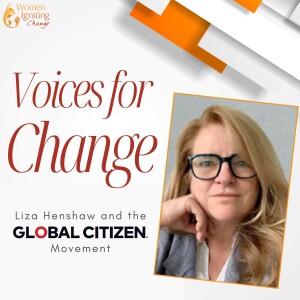
Monday Apr 15, 2024
Monday Apr 15, 2024
“People want to come along with you as long as they know you’ve designed an outcome that genuinely changes the world,” says Liza Henshaw, president of Global Citizen, an international organization dedicated to advocacy and education. Under the motto “actions are our currency,” 12 million citizens have committed over 33 million acts of service—ranging from reading articles to contacting legislators to committing to a week of plastic-free living. With its “Power Our Planet” campaign, Global Citizen rallied its community as well as several big-name artists like Billie Eilish and Lenny Kravitz to petition the World Bank to allow the country of Malawi a debt pause clause in the wake of Cyclone Freddy. On this episode of Women Igniting Change, Liza explains how this campaign has changed the approach to natural disaster relief going forward. She’ll also explain how Global Citizen, known for its music festivals, aims to pioneer a world class touring circuit across the continent with its Move Africa initiative.
By returning to the same markets over a five-year period, Move Africa will invest in and build relationships with local markets, businesses and entrepreneurs. Creating jobs and skills, it will attract the capital needed for these businesses in order to support the touring market and the creator economy that bolster a world class tour, ultimately, driving investment in the African entertainment industry. Liza tells the story of Christian, a small business owner in Rwanda, whose business and skillset were expanded exponentially after being approached by Global Citizen to produce a show featuring hip hop artist Kendrick Lamar.
This is the difference made when an organization creates sectors versus merely creating jobs, Liza explains. Join today’s discussion to learn how Global Citizen plans to continue to create systemic change on a global scale, and how you can get involved.
Quotes
“Just because you don’t know it, doesn’t mean you should be afraid of it. It just means go and embrace it and it’s pretty fun. It still is.” (8:35 | Liza Henshaw)
“You’d be surprised. People want to come along with you as long as they know you’ve designed an outcome that genuinely changes the world.” (19:15 | Liza Henshaw)
“A lot of people want to talk about investment in Africa and job creation in Africa, but when you create the sector, which is what this touring business will do, it makes it a lot easier to create the jobs because now the sector and that economy can support it.” (24:48 | Liza Henshaw)
“We don’t do any of that on-the-ground work. I don’t want a single local charity to say, ‘Oh, no. Global Citizen’s coming in and it’s going to suck the oxygen out of my…’ I need those people. We are not the traditional charity that builds the schools and the water wells. We need those groups on the ground. I want to take the Global Citizen spotlight and shine that right on what you’re doing and hope that more donations come to you from that.” (29:01 | Liza Henshaw)
Links
Connect with Liza Henshaw:
Website: https://www.globalcitizen.org/en/
Instagram: https://www.instagram.com/glblctzn/
Connect with Robbin Jorgensen (She/Her):
Website: https://womenignitingchange.com
LinkedIn: https://www.linkedin.com/company/women-igniting-change/
LinkedIn: https://www.linkedin.com/in/robbinjorgensen/
Facebook: https://www.facebook.com/robbin.jorgensen/
Podcast production and show notes provided by HiveCast.fm
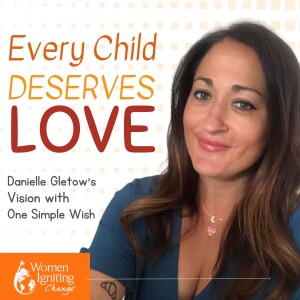
Monday Apr 08, 2024
Monday Apr 08, 2024
“The way we do things is really about letting people know that they’re seen, heard and loved,” says Danielle Gletow, founder and executive director of One Simple Wish, which works to fulfill gift requests for those—of any age— who’ve been through the foster care system or are in crisis due to childhood trauma. For those who’ve been denied so much in life, even asking for something small is an act of bravery. In stark contrast to the many videos across social media where donors exhibit themselves giving flashy gifts to unsuspecting recipients for the sake of clicks and drama, One Simple Wish works to foster community by empowering a person in the recipient’s life to fulfill the recipient’s specific and personal request in a comfortable and private environment.
On today’s episode of Women Igniting Change, Danielle explains how her own experiences fostering and adopting children ignited in her a fierce desire to protect children across the world. She describes the shocking responses she’s received as a passionate advocate for children’s rights and the prejudice to which children in the foster system are subjected. These children are not just statistics, she reminds us, but humans who want what we all want—love, hope, joy, a sense of home and the freedom to just be kids.
Working with more than one thousand organizations across the United States, Danielle has helped fulfill hundreds of thousands of wishes to date. She’ll tell you how you can get involved in impacting the life of a child, one simple wish at a time.
Quotes
“They really wanted just a few things, which is what most people want: they wanted to be back home, they wanted to feel loved, and they wanted to just be a kid. And that really struck me.” (2:52 | Danielle Gletow)
“I wanted to create something that made it easy for people to not see statistics but to see people, and then to do something for them, not to do something they wanted to do, or they thought someone needed, but to actually hear somebody saying, ‘This is what would bring me joy, this is what would make me feel seen,’ and then empowering others to give them that.” (3:51 | Danielle Gletow)
“I know people love these Instagram, Youtube, Tiktoks where somebody goes and surprises somebody with a grand gesture, and they have a camera on them and there are all these expectations of gratitude being expressed. Not that we’ve never done that but I find it kind of icky... This isn’t about you as a donor, about what you want to give someone and it’s not your experience.” (15:35 | Danielle Gletow)
“The act of wishing itself is difficult. It’s not something that everybody feels comfortable doing, because life has not been that way for them where there is a comfort level. There’s been a lot of disappointment. There have also been a lot of people who have told them, ‘You get what you get and you don’t get upset,’ or just be glad you have anything.’ So, when individuals trust us with a really, unique, personal wish, it’s not lost on me that it was hard to even ask for that.” (26:55 | Danielle Gletow)
Links
Connect with Danielle Gletow:
Website: https://www.onesimplewish.org
Facebook: https://www.facebook.com/onesimplewish
Instagram: One Simple Wish
Connect with Robbin Jorgensen (She/Her):
Website: https://womenignitingchange.com
LinkedIn: https://www.linkedin.com/company/women-igniting-change/
LinkedIn: https://www.linkedin.com/in/robbinjorgensen/
Facebook: https://www.facebook.com/robbin.jorgensen/
Podcast production and show notes provided by HiveCast.fm

Monday Apr 01, 2024
Monday Apr 01, 2024
“I was blown away. I’d never seen that concentration of students of color being met with high expectations,” says Lacey Robinson, of an encounter early in her teaching career. This experience would serve as the impetus for her career-long mission: to promote equity in education for underserved and socio economically disadvantaged students, particularly students of color. As president and CEO of UnboundED, she works to enable educators to disrupt system inequities in their school districts and classrooms. In a world where people of color are the global majority, students need to be met— engaged with, supported and affirmed—where they are, and their circumstances—such as coming from a home where a second language is spoken exclusively—should be treated as learning assets rather than learning deficits. In this episode of Women Igniting Change, Lacey discusses the impact of bias in education and the most common challenges most teachers face in promoting equity in teaching and learning.
Focusing on students in the margins ultimately benefits all students as well as the community at large. Lacey explains the U.S. is in a security crisis with K-12 students graduating en masse without the mathematical skills to keep up in the technology, innovation, and defense sectors. Teachers, in turn, need the kind of steady professional development and career support that is available to most other professions.
Join today’s discussion to learn what needs to be done at the legislative level to support the mission of UnboundED, and what role technology and digital tools will play in contributing to it. Lacey explains the real reason people are afraid of Artificial Intelligence, and why, actually it’s here to help.
Quotes
“This justice thing went off in me. I cried, then I got mad, then I thought, ‘What is going on? Why can’t all students—everywhere, regardless of who they are, where they live—why aren’t all teachers being prepped to do this?’ That was the beginning of my justice seeking.” (4:30 | Lacey Robinson)
“Teachers aren’t magical beings. They don’t walk into the classroom with dust that they sprinkle around, and all of a sudden all the kids are learning how to read, write, do math and have science inquiry. Teachers need, like every profession, a high-quality professional development that supports them in their career trajectory.” (13:42 | Lacey Robinson)
“I think it’s just absurd that we live in a moment where you have a public school educator who’s working in a school community in which there’s a variance of a global majority, there’s a variance of cultures and people and you’re actually asking them to ignore that.” (16:47 | Lacey Robinson)
“Our goal is to reach all students. We focus on the students on the margins because if we focus on the least of them, the ones who’ve received the least amount of belief, we know we’re going to capture all of them.” (20:12 | Lacey Robinson)
“We’re scared [of AI] because we haven’t done a sufficient enough job of evolving our authentic intelligence. Authentic intelligence wouldn’t lend itself for you to say, ‘I’m not a math person,’ or to say you’re shy about reading books, or learning about nonfiction topics that aren’t in your realm.” (31:35 | Lacey Robinson)
Links
Connect with Lacey Robinson:
Website: www.unbounded.org
LinkedIn: https://www.linkedin.com/in/mslaceyrobinson/
Justice Seekers Book: https://www.unbounded.org/justice-seekers-book?hsCtaTracking=e2802317-b0a4-4d82-a5a7-99de0910d25f%7Cfdd0cff2-9c17-47c3-a06e-0c3bda27c5fe
Connect with Robbin Jorgensen (She/Her):
Website: https://womenignitingchange.com
LinkedIn: https://www.linkedin.com/company/women-igniting-change/
LinkedIn: https://www.linkedin.com/in/robbinjorgensen/
Facebook: https://www.facebook.com/robbin.jorgensen/
Podcast production and show notes provided by HiveCast.fm
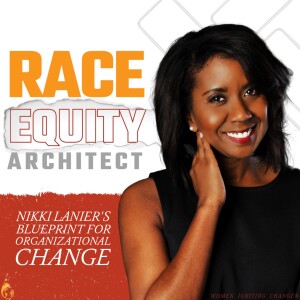
Monday Mar 25, 2024
Monday Mar 25, 2024
“We’ve inherited a narrative,” says today’s guest Nikki Lanier, “that Black and Brown people matter in certain contexts and White people matter almost all the time, and we don’t realize how much of that plays out subtly at work.” As Founder and CEO of Harper Slade, a strategic advisory firm dedicated to helping people of color thrive in the workplace, Nikki works to reset how humans engage with one another in the workplace by unearthing, challenging and transforming deep-seated beliefs around race. Through conversations, and using a Racial Equity Index, she diagnoses and addresses inequities within organizations. People of color are often not in close proximity to decision-makers and opportunities, are criticized publicly whereas White coworkers are criticized privately, and are made to feel responsible for others’ feelings.
Nikki learned her gracious and patient approach to change from her parents, who were active in the U.S. Civil Rights movement. Her role is not to blame or even to fix, but to advise and help build a company’s overall success. She discusses the impact of racism on the economic landscape, as Black and Brown people transition into the majority population in the U.S., as well as the middle class, and why we might be potentially be looking at an economic apartheid state.
The goal is not to condemn or blame anyone. Racism is a lie told to all of us and we’re all responsible for changing the way we engage with each other. Join today’s episode of Women Igniting Change to learn more about the RAARE Woman Collective, which teaches white women how to have empathetic and productive conversations which promote real and long-lasting change within families and communities.
Quotes
“We’re coming into the workplace, we walk into any kind of social construct already believing something about something. But we spend so little time really unearthing and understanding that belief, and in my opinion, that’s really where the work lies.” (7:24 | Nikki Lanier)
“It’s not so much about the ‘safe,’ because I don’t know if I can ever create a safe environment. But what we do want is a courageous environment. We want you to move the work forward in spite of feeling unsafe because everything about this work is disruptive.” (8:58 | Nikki Lanier)
“Most of our employers are well-meaning, well-intended but, to be blunt, fairly myopic. We’ve been conditioned to know a singular way to think about how work is navigated and how work is experienced.” (16:15 | Nikki Lanier)
“Now for the first time ever, in just 21 years, we will be relying on Black and Brown people to be in the middle class, represented in the middle class, well, all throughout it, so that the formulas, the thinking, the presumptions and the theories around monetary policy and fiscal policy can work.” (25:44 | Nikki Lanier)
“What I worry about sometimes in the name of racial equity or DEI is that we reduce the work to harm swapping. ‘I’ve suffered for so long; now it’s your turn to suffer.’ Or, ’The only way I can get you to wake up is to yell at you and to cuss at you and to condemn the “who” of you.’ We’ve lost sight of the art of critical thinking, of dissecting arguments, to compartmentalize the person from the issue.” (36:02 | Nikki Lanier)
Links
Connect with Nikki Lanier:
Website: https://www.harperslade.com/
Nikki’s personal website: www.nikkilanier.com
LinkedIn: https://www.linkedin.com/in/dr-nikki-r-6a106a8/
RAARE Woman Collective: https://www.raarewomancollective.com/
Federal Reserve of San Francisco Report: The Economic Gains From Equity
Connect with Robbin Jorgensen (She/Her):
Website: https://womenignitingchange.com
LinkedIn: https://www.linkedin.com/company/women-igniting-change/
LinkedIn: https://www.linkedin.com/in/robbinjorgensen/
Facebook: https://www.facebook.com/robbin.jorgensen/
Podcast production and show notes provided by HiveCast.fm
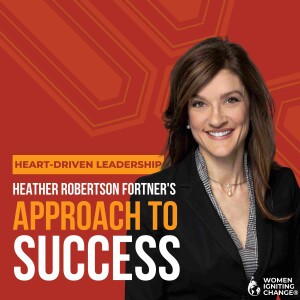
Monday Mar 18, 2024
Monday Mar 18, 2024
Heather Robertson Fortner epitomizes two pivotal values: congruence and authenticity. As the leader of Signature FD, she emphasizes the significance of personal growth to provide unparalleled financial guidance, aiming to impact her clients' family legacies profoundly. Recognizing the importance of unity, Heather believes in a team's collective commitment to each other and the firm's goals, even in the face of disagreement. She advocates that earning trust from clients and team members alike hinges on genuine care and mutual respect.
Heather's counseling background informs her approach to leadership, prioritizing personal development and support for individuals to reach their full potential. She highlights the critical role of diversity within any organization and shares her experiences as a woman in a male-dominated field, especially during a significant wealth transition to female leaders.
Tune into this episode of Women Igniting Change, where Heather delves into purpose-driven leadership, her innovative approach to change, and her aspirations for creating a different future for her daughters.
Quotes
“Coaching is different than managing; it’s different than just leading. You are in the trenches, you are with, you are along side. You are probably pushing people to a place where they’re a little bit uncomfortable because a coach’s job is to help you grow.” (3:51 | Heather Robertson Fortner)
“My philosophy has always been that as a leader you should be willing to do the same thing that you are asking other people to do.” (14:21 | Heather Robertson Fortner)
“You want to lead well? Then you’re going to have to do it not only in this seat but it’s going to have to be congruent to the seat you hold at home.” (24:10 | Heather Robertson Fortner)
“There’s going to be this massive movement in money. And more than we have ever seen historically, women will be in decision-making positions with money.” (32:08 | Heather Robertson Fortner)
“I have no time, or space, or energy or desire to sit in a room with a bunch of people who want to maintain status quo. I’ve got too much stuff to do, too many things that I want to do and I sure don’t want it to be status quo for my girls.” (41:16 | Heather Robertson Fortner)
“I would say to leaders today, you have got to be excellent at discerning about what is noise and what is important, and you have got to be willing to not be perfect and to let go of the things that don’t matter in pursuit of the thing that does.” (44:45 | Heather Robertson Fortner)
Links
Connect with Heather Robertson Fortner:
Website: https://signaturefd.com/
NetWorthwhile: https://signaturefd.com/#networthwhile
LinkedIn: https://www.linkedin.com/in/heatherfortner/
Connect with Robbin Jorgensen (She/Her):
Website: https://womenignitingchange.com
LinkedIn: https://www.linkedin.com/company/women-igniting-change/
LinkedIn: https://www.linkedin.com/in/robbinjorgensen/
Facebook: https://www.facebook.com/robbin.jorgensen/
Podcast production and show notes provided by HiveCast.fm

Monday Mar 11, 2024
Monday Mar 11, 2024
“Reproductive health includes so much more than just abortion, yet that’s all people think about because it’s been so politicized,” says Pari, who along with Eve, is working to combat mis-and dis-information about reproductive rights. Recognizing that the majority of Americans under 30 use social media as a legitimate new source, and that there was a lack of pro-choice presence across the platforms, the two women provide education and awareness building about reproductive rights on their social media channel @gemma_talks. This begins with clarifying the differences among reproductive rights, reproductive health and reproductive justice, respectively. It continues by reiterating that, since “the fall of Roe,” the consequences of denying women their reproductive rights are dire, and they affect everyone in ways they often don’t realize.
Social accountability presents a unique set of challenges. Whereas traditional advocacy is more focused, Pari and Eve have to design their message for an audience which varies wildly in terms of education and awareness. They work to help build sexual reproductive healthcare ecosystems which include everyone from health service providers to funders to advocacy groups and social movements, all of which remain vulnerable in a shifting political landscape where funding is limited. Still, they are hopeful that through their “vigilante activism” they will reach and transform tomorrow’s change-makers and in doing so, ultimately have a lasting impact on policy.
Quotes
“This is an arena where genuine change needs to be made for women to be able to truly self actualize to their full potential.” (4:57 | Pari)
“Quite frankly, women are tired. We’re tired. Advocacy work is important because it helps reignite people’s energy. It helps them remember their voice again and that they have something to fight for. When you add in the public health lens, it really highlights that nothing exists in a vacuum. Every health issue intersects with race, with income, with environment, just to name a few, and public health makes it clear that women’s issues aren’t just women’s issues. They affect everybody.” (10:05 | Eve)
“Social accountability is so important. In regular reproductive health programming, social accountability tools are exceptionally useful for driving civic engagement, building relationships between community members and duty bearers, and facilitating the creation of action plans and generating collective responsibility.” (20:55 | Pari)
“Advocacy on social media is made additionally complicated by the fact that your audience can be absolutely anyone. Normally, advocacy’s targeted, but on social media, there isn’t a baseline for someone’s awareness of an issue, or level of engagement, or even level of investment, and, frankly, even education level. You have to design your messages in a way that speaks to a broad depth of comfort with that issue.” (23:53 | Pari)
“One thing that people don’t think about, though, is how abortion bans make it more dangerous for women who genuinely want to get pregnant. So, some of my friends who very much want a baby are scared to get pregnant because if anything goes wrong, their life may be at risk depending on their zip code.” (26:23 | Eve)
Links
Connect with Pari and Eve
Instagram: @gemma_talks
TikTok: @gemma_talks
Connect with Robbin Jorgensen (She/Her):
Website: https://womenignitingchange.com
LinkedIn: https://www.linkedin.com/company/women-igniting-change/
LinkedIn: https://www.linkedin.com/in/robbinjorgensen/
Facebook: https://www.facebook.com/robbin.jorgensen/
Podcast production and show notes provided by HiveCast.fm

Women Igniting Change®
Founder and CEO of Women Igniting Change®, is your host. A former corporate executive, passionate human and women's rights activist, and global speaker, who has worked with women leaders in 14 countries on 6 continents believes that unleashing the contribution of women is one of the key drivers to moving business and humanity forward.


